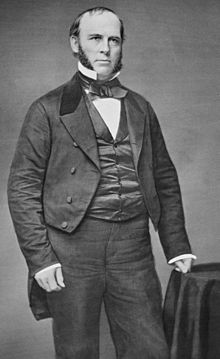Charles Durkee
Charles Durkee | |
|---|---|
 | |
| 6th Governor of Utah Territory | |
| In office September 30, 1865 – January 9, 1869 | |
| Preceded by | James Duane Doty |
| Succeeded by | John Shaffer |
| United States Senator from Wisconsin | |
| In office March 4, 1855 – March 3, 1861 | |
| Preceded by | Isaac P. Walker |
| Succeeded by | Timothy O. Howe |
| Member of the U.S. House of Representatives from Wisconsin's 1st district | |
| In office March 4, 1849 – March 3, 1853 | |
| Preceded by | William P. Lynde |
| Succeeded by | Daniel Wells Jr. |
| Personal details | |
| Born | December 10, 1805 Royalton, Vermont |
| Died | January 14, 1870 (aged 64) Omaha, Nebraska |
| Resting place | Green Ridge Cemetery Kenosha, Wisconsin |
| Nationality | American |
| Political party |
|
| Spouses |
|
| Children |
|
Charles H. Durkee (December 10, 1805 – January 14, 1870) was an American pioneer, Congressman, and United States Senator from Wisconsin. He was one of the founders of Kenosha, Wisconsin, and was a Governor of the Utah Territory in the last five years of his life.
Early life
Durkee was born in Royalton, Vermont. He became a merchant and moved to the Wisconsin Territory in 1836. There he became involved in agriculture and lumbering, and was a founder of the town of Southport (later Kenosha, Wisconsin). Land he once owned in Kenosha is now part of the Library Park Historic District.[1]
Career
He entered politics, serving two terms in the Wisconsin Territorial Legislature. He became a member of the Free Soil Party and was elected to the United States House of Representatives in 1848 as part of Wisconsin's first full congressional delegation. He served in the House for two terms as part of the 31st and the 32nd Congresses from March 4, 1849, till March 3, 1853, representing Wisconsin's 1st congressional district. In 1854, he switched to the newly formed Republican Party and was elected to the United States Senate by the Wisconsin State Legislature. He served for one term, from 1855 to 1861. In 1865 he became governor of the Utah Territory, and served in that position until 1869 when he resigned because of ill health.[2] He died in Omaha, Nebraska while returning home.[3]
Tributes
A street in the city of Appleton, Wisconsin, is named for him. An elementary school in Kenosha, Wisconsin, bore his name for many years. It was demolished in 2008.
He gave a speech at the hammering of the Golden Spike in Promontory, Utah, on May 10, 1869, connecting the Union Pacific tracks to the Central Pacific Railroad.[4]
His former home, which later became an Episcopal school for girls and is now known as Kemper Hall, is listed on the National Register of Historic Places.[5]
References
- ^ http://www.waymarking.com/waymarks/WM5H6T_Library_Park_Historic_District_Kenosha_WI
- ^ http://historytogo.utah.gov/people/governors/territorial/durkee.html
- ^ "Durkee, Charles 1805 - 1870". Wisconsin Historical Society. Retrieved August 17, 2020.
- ^ "The Last Spike is Driven" pg. 34. http://cprr.org/Museum/Last_Spike_is_Driven.pdf
- ^ http://www.waymarking.com/waymarks/WM5HJ4_Kemper_Hall_Kenosha_WI
Further reading
- Wilson, James Grant; Fiske, John, eds. (1898). "Durkee, Charles". Appletons' Cyclopædia of American Biography. Vol. Volume 2 (Crane–Grimshaw). New York: D. Appleton and Company. pp. 272–273.
{{cite book}}:|volume=has extra text (help) - McMullin, Thomas A.; Walker, David (1984). "Utah: Durkee, Charles (1865–1869)". Biographical Directory of American Territorial Governors. Meckler Publishing. pp. 299–300.
External links
- United States Congress. "Charles Durkee (id: D000573)". Biographical Directory of the United States Congress.
- Charles Durkee Sr. at Find a Grave
- 1805 births
- 1870 deaths
- Governors of Utah Territory
- Members of the Wisconsin Territorial Legislature
- Members of the United States House of Representatives from Wisconsin
- People from Royalton, Vermont
- United States senators from Wisconsin
- Wisconsin Republicans
- Utah Republicans
- Wisconsin Free Soilers
- Republican Party United States senators
- Free Soil Party members of the United States House of Representatives
- 19th-century American politicians


